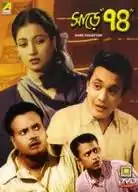Sharey Chuattor
Sharey Chuattor (Bengali: সাড়ে চুয়াত্তর; English: Seventy Four and Half) is a 1953 Indian Bengali-language comedy film, directed by Nirmal Dey, based on a story by Bijon Bhattacharya. The film stars Tulsi Chakraborty and Molina Devi, and co-starring Uttam Kumar, Suchitra Sen, Bhanu Bandopadhyay, Jahor Roy and Nabadwip Haldar. Contemporary playback singers like Dhananjay, Dwijen Mukherjee, Shyamal Mitra, and Manabendra Mukherjee also acted in this film.
| Sharey Chuattor | |
|---|---|
 Original poster of Sharey Chuattor | |
| Directed by | Nirmal Dey |
| Story by | Bijon Bhattacharya |
| Starring | Tulsi Chakraborty Molina Devi Uttam Kumar Suchitra Sen Bhanu Bandopadhyay Jahor Roy Nabadwip Haldar |
| Music by | Kalipodo Sen |
| Cinematography | Amal Das |
| Edited by | Kali Raha |
Release date | 20 February 1953[1] |
| Country | India |
| Language | Bengali |
Plot
The Annapurna Boarding House owned by Rajanibabu (Tulsi Chakraborty) is a peaceful abode where the residents are all friendly except Shibbabu, a senior learned man, who sometimes acts as a killjoy. The story begins when Romola (Suchitra Sen), a relative of Rajanibabu and her family comes to stay in the boarding, after being thrown out of their rented house. Rajanibabu calls a meeting where all the residents except Shibbabu cast vote in favour of Romola's staying.
Rampriti (Uttam Kumar), the son of a wealthy family, who also stays at the boarding, is away home. On the day of his return, he telephones Annapurna Boarding to inform the cook Modon (Nabadwip Haldar) to prepare food for him that night. Seeing no one to answer the phone, Romola picks it up, but Rampriti does not believe that there's a girl in the boarding and so an exchange of hot words takes place. Rampriti, after returning narrates the incident to Kedar (Bhanu Bandopadhyay), another resident of the Boarding. Romola overhears them and berates Rampriti, silencing him.
However, they fall in love and exchange love letters, but this fact becomes known to the other residents and they start teasing both of them. Rajanibabu, the go-between, is given a love letter to deliver but as he's hurrying to catch the train home, he keeps it in his pocket. At home, he quarrels with his wife (Molina Devi) and leaves the house in the middle of night. His wife manages to find the love letter and thinks that her husband is running an extramarital affair.
Seeing that Romola and Rampriti are in love, Rajanibabu makes the marriage arrangements for them and calls Rampriti's and Romola's father.
Rajanibabu's wife prepares a puja to bring him back. She becomes impatient and goes to the Boarding House. She charges her husband of infidelity and drags him to another room where Rajanibabu tells her the truth about the letter. He says, it is about Rampriti and Romola, the couple who are getting married the very day. The residents make fun of them and the film ends with Rampriti and Romola sitting side-by-side at the marriage altar.
Cast
| Cast | Character |
|---|---|
| Tulsi Chakraborty | Rajanibabu, Owner of the Boarding House |
| Molina Devi | Rajanibabu's wife |
| Uttam Kumar | Rampriti |
| Suchitra Sen | Romola |
| Bhanu Bandopadhyay | Kedar |
| Jahor Roy | Kamakhya |
| Nabadwip Haldar | Modon |
| Gurudas Bannerjee | Romala's father |
| Padma Devi | Ramala's mother |
| Sital Bannerjee | Resident at the mess |
| Dhananjay Bhattacharya | Akhil Babu |
| Panchanan Bhattacharya | Elderly resident at the mess |
| Reba Bose | |
| Shyamal Mitra | Resident at the mess |
| Manabendra Mukhopadhyay | Resident at the mess, Singer |
| Sanat Singha | Resident at the mess |
| Shyam Laha | Resident at the mess |
| Ranjit Roy | Resident at the mess |
Music
- Lyrics by Sailen Roy
- Music Direction by Kalipodo Sen
- "Amar Ei Jouban" - Chorus (Shyamal Mitra, Manabendra Mukhopadhyay, Dwijen Mukherjee, Dhananjay Bhattacharya, Pannalal Bhattacharya, Sanat Singha.)
- "E Maya Proponchomoy" - Dhananjay Bhattacharya
- "Dio Go Basite Bhalo" - Suprova Sarkar
Reception
The Times of India called the film, "one of the best Bengali old comedy movies which is still a must-watch."[2]
References
- Citations
- "Sare Chuattor completes 60 years". Ananadabazar Patrika (Patrika, page 1). 2 March 2013.
- "'Sharey Chuattar' (1953)". The Times of India. Retrieved 29 September 2020.
- Sources